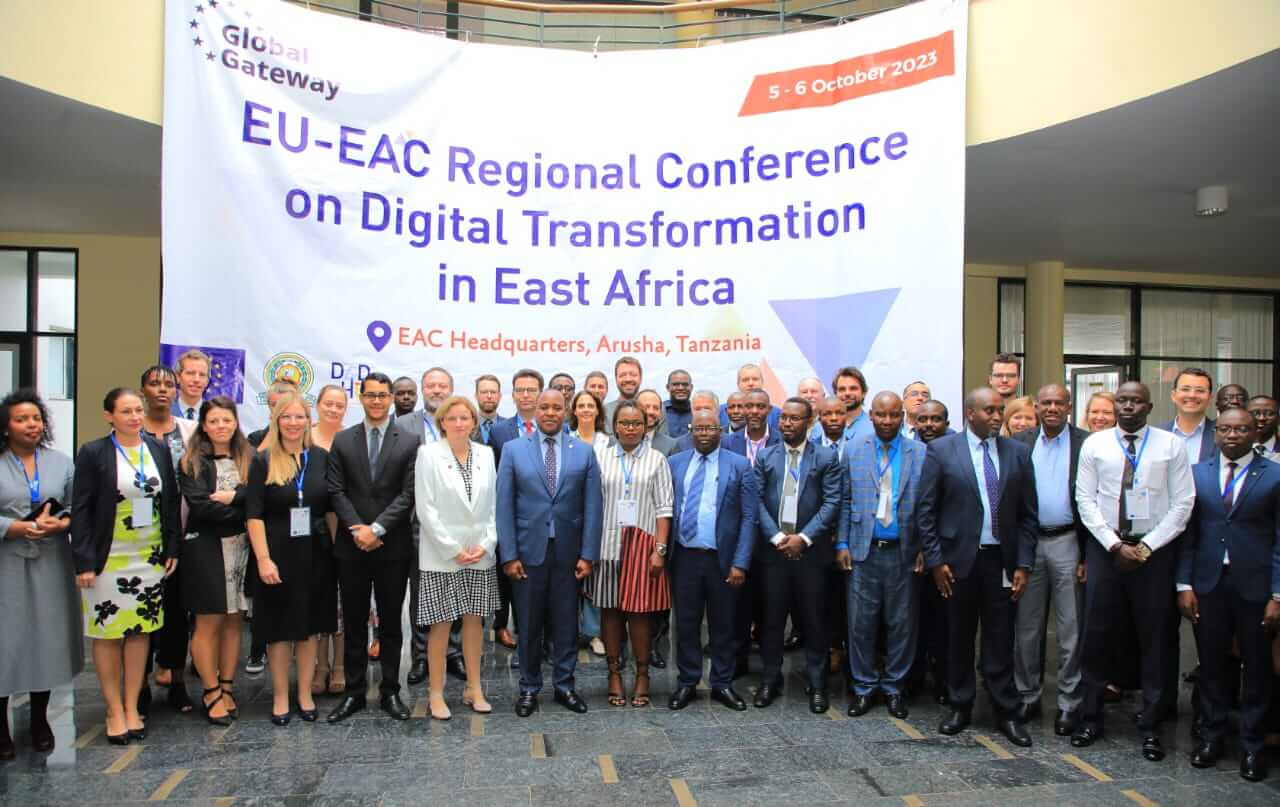
Our Projects are
Transforming African Trade
Quick Contacts
2nd Floor, Fidelity Insurance Centre Waiyaki Way, Westlands

THE East African Community (EAC) and the European Union (EU) have committed and agreed to foster a human-centric digital transformation in East Africa.
The agreement centred on utilising digital technologies and innovations for regional integration.
The mutual agreement came after a two-day conference that was facilitated by the Digital for Development (D4D) Hub, which unites key stakeholders from the EAC region and European partners.
The EAC Secretary General, Dr Peter Mathuki, who officially opened the two-day conference, said that the EAC is keen on creating a single regional digital market comprising an online market, a data market, and a connectivity market.
“This is underpinned by digital skills, innovation, infrastructure, financing and a conducive legal and regulatory environment.
“Achieving this requires digitalisation in various sectors and integration platforms,” said Dr Mathuki when opening the 1st EU-EAC Regional Conference on Digital Transformation in the East African Community, in Arusha, Tanzania last Thursday.
The EAC’s primary goal is to develop a regional digital market for digital trade in East Africa. Also, the digital initiative is crucial for the development of the region, as well as for the effective implementation of the African Continental Free Trade Area (AfCFTA).
“Our partner states also need to agree on regulations to foster digital markets, including data governance and artificial intelligence (AI) standards,” said the Secretary General adding:
‘‘It is also incumbent on partner states to harmonise regulations and build capacity for data governance and AI standards.”
The EAC and EU collaborative effort aims to assess the current state of digital transformation in the region and explore opportunities through a “Team Europe” initiative, which includes the EU and its member states.
The strategy aims to mobilise 300 billion euros in investment to boost smart, clean and secure links in digital, energy and transport sectors and to strengthen health, education and research systems across the world.
EU Ambassador to Tanzania Christine Grau emphasised Team Europe’s determination in its commitment to supporting the digital transformation of East Africa and global partners.
“Our goal is to maximise the impact of digitalisation as a driver for social and economic growth while working towards the achievement of the SDGs in our partner countries,” Ms Grau said in her speech.
The European Commission’s Digital4Development (D4D) approach recognises the potential of digital technologies and services as powerful enablers for sustainable inclusive development and growth worldwide.
The global gateway programme, launched in 2023, demonstrates EU commitment to digitalisation approach.
The conference’s attendees include representatives from the EAC Secretariat and other EAC Institutions, ICT ministries of EAC partner states, the EU delegation to Tanzania and the EAC and EU member states.
Smart Africa CEO Lacine Koné highlighted the bold and innovative commitment from African heads of state and government to accelerate sustainable socio-economic development on the continent, ushering East Africa into a knowledge economy through affordable access to broadband and the usage of Information and Communications Technologies.
The D4D Hub serves as an important instrument for the EU and its member states to support transformational projects across the African continent.
This aligns harmoniously with the ambitious goals under the Global Gateway, a new strategy for the EU.
The conference identifies seven strategic areas of engagement, aligning with the priorities of the 6th EAC Development Strategy, which seeks to expedite digital transformation in East Africa.
These areas include connectivity, data governance, e-governance/cyber security, e-commerce, information communication telecommunication regulations, digital innovation and digital skills.
Based on these areas of engagement, a joint roadmap has been developed with the purpose of guiding the cooperation between EAC and Team Europe. Among the identified short-term actions are: A proposal to boost data economy across borders as well as benchmarking and project development of green and secure data centres (data governance); establishing comprehensive electronic cross-border health services (e-governance/cyber security); development of systems to facilitate a cross-border e-payment system (e-commerce).
Additionally, the significance of the conference was further underscored by the simultaneous launch of the digital economy package by the EU Commissioner for International Partnerships, Jutta Urpilainen, set for Nairobi on October 5, 2025.
The conference emphasises the EU’s commitment to digital transformation in East Africa, reaffirming its dedication to nurturing innovation and fostering connectivity within the region.
Read original article
Disclaimer: The views and opinions expressed in this article are those of the authors and do not necessarily reflect the official policy or position of TradeMark Africa.